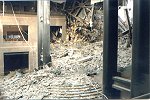| |
 |
Production
Notes
by
James Ronald Whitney, filmmaker |
|
September
2001

|
10
Days Of Filming
|
 |
|
| 2 |
3 |
4 |
5 |
6 |
7 |
1/8 |
| 9 |
10 |
11
Day 1
|
12 |
13
Day 3 |
14
Day 4 |
15
Day 5 |
16-19
Days 6-9
|
20
Day 10 |
21 |
22 |
| 23/30 |
24 |
25 |
26 |
27 |
28 |
29 |
 DAY 2:
DAY 2:
When I woke up, I waited before opening my eyes. I knew that
I would either see the skylight in my bedroom--if the attack
had only been a nightmare--or the peeling paint on my friend's
ceiling--if the attack had been a reality. I saw the peeling
paint. It was early, and after loading up on film, I bought
a painter's mask and a fake NYC Policeman's shirt in Chelsea
(where else?), and headed back to Ground Zero where I met Dan,
a cop who made me a deal I couldn't refuse. The police force
would not let anyone into the area, so Dan said he would give
me unrestricted access to the site if he could get a set of
my prints.
| I
spent hours shooting rolls of film and observing the devastation
first hand. The steps leading to my company's headquarters
had been completely destroyed, and the windows were all
blown out. Richard Reichgut, my executive producer, has
an office located on the 43rd floor of the same building
in the World Financial Center. |
 |
The stock market was closed, there was no electricity, phone
or water in lower Manhattan, I was still evacuated, my cell
phone wasn't getting a signal, and suddenly, all I wanted to
do was check on some of my friends who I thought might have
been in the Twin Towers when they collapsed. So after shooting
about a dozen rolls of film, I headed north to St. Vincent's
Hospital, where thousands of the fliers of missing loved ones
wallpapered everything from the hospital to the bus stop. Aside
from making certain that my friends and colleagues were okay,
my primary concern was for the children whose parents were killed
in the attack. I began writing down the phone numbers of fliers
that showed missing parents with their children, so I could
later contact some of the families and put them in touch with
hotlines that had been set up like www.childtrauma.org.
I'm affiliated with a number of child advocacy groups, including
Love Our Children USA, The Children's Advocacy Center of New
York, Save Our Children and Childhelp USA, the largest of these
organizations in the United States. In fact, my last two movies
have been about issues involving children.
|
Later
that day, I made my very first call to the family of
a little boy who was missing his mother, Michele Lanza.
Michele,
an outgoing 36-year-old blonde professional, had been
separated from her husband, Robert, who was living in
Virginia. Since the separation, Michele had been living
in Tottenville on the top floor of a big blue house
that she shares with her 7-year-old son, Nicholas.
|
 |
Tottenville is 20 miles from Manhattan, and it is both the last
town on Staten Island and the last town in New York. Michele
has a younger sister named Cindy, and an older sister named
Susan, both of whom live with their parents, Ethel and Al, just
a few houses up the block from Michele and Nicholas' home. Susan
answered the phone. Her tone was serious, and I could tell from
her "Hello" that she had received scores of calls since the
attack, and that she was hoping for some news. I introduced
myself, and asked if the family had heard anything about Michele.
Susan said that she was still missing, and that the family was
waiting for her to walk through the door any minute.
Susan is single, she has a Ph.D. in naturology and a degree
in spirituality, and she lives in the basement of her parent's
home. Cindy lives on the second floor with Dominick and their
two children, 9-year-old Nicolette, and 3-year-old Jackie. Until
the separation a year ago, Michele and Nicholas had been living
with Robert down in Virginia. The day of the attack, Robert
drove to Staten Island to be with Nicholas. A very religious
man of the Apostolic faith, Robert had been praying for his
wife's safe return home. He too, was convinced that Michele
was only missing, so he decided not to tell his son about the
attack. He simply told Nicholas that his mother was having some
problems with transportation.
Susan told me on the phone that Robert had called his pastor,
who was planning to come to the house and talk to Nicholas on
Day 3 if Michele had not yet returned home. I told Susan that
I had shot the collapse of the towers, and that I was still
filming anything to do with the attack. I asked her if I could
come to the house on Day 3, and meet the family, and possibly
talk to them on camera about what they were going through emotionally.
I was most interested in talking to Robert about the unimaginable
burden with which he was faced. Even with the pastor's support,
if Michele did not return home, as the surviving parent, Robert
was going to have to tell Nicholas that his mother is either
missing, or that his mother is dead.

|
Continue
|
 |
|
© 2001-03 James Ronald Whitney
See the Web sites for the director's other films: Just, Melvin, TheWorkingGirl.com and Games People Play
Comments or questions about the Web site contact the WebMaster at M2 Media Designs 2011
|
|

